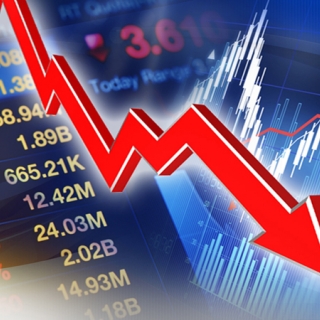


Stocks fell on Thursday as investors digested President Donald Trump's latest tariff threats while they pored over new U.S. inflation figures.
The Dow Jones Industrial Average fell 254 points, or 0.6%. The S&P 500 fell 0.7%, and the Nasdaq Composite dropped 1.2%.
Trump used his Truth Social platform to threaten a 200% tariff on all alcohol products coming from countries in the European Union in retaliation for the bloc's 50% tariff on whiskey. "This would be great for the Wine and Champagne business in the U.S.," he wrote.
Concerns over U.S. trade policy have hurt stocks this week.
The S&P 500 and Nasdaq are on track to lose 3.3% and 3.7% this week, respectively. The Dow fell 3.6% in the period, heading for its worst week since March 2023. The broad market index briefly dipped into correction territory on Tuesday, down 10% from a record set in February.
Investors, however, got more encouraging inflation data on Thursday. The February producer price index — which measures the cost of producing consumer goods and is a good indicator of inflationary pressures — was flat for the month, compared with an increase expected. That, along with a weaker-than-expected February consumer price index reading, may have helped ease traders' concerns about the direction of the economy and the impact of tariffs on inflation.
While market strategists have been watching for a technical bounce after the recent selloff, some say the latest inflation data may not be enough to cause a substantial recovery. Concerns over Trump's trade policies remain a major drag on investor sentiment, and that raises questions about how the Federal Reserve might proceed with interest rates.
"We still believe the Fed's next move will be lower, but it's hard to have much conviction with the impact of tariffs still uncertain," said Scott Helfstein, chief investment strategist at Global X. "The key question is whether tariffs will have a bigger impact on growth or prices. In recent weeks, the interest rate market has signaled that weaker growth is a bigger concern with three cuts now priced in for this year." (Newsmaker23)
Source: CNBC
Tested EN...
Asian stock markets weakened for the second consecutive day, indicating that the initial rally that had been "speedy" at the start of the year is starting to lose steam. At the same time, US governmen...
US stocks were mixed on Wednesday as investors weighed uneven economic data against expectations for eventual Federal Reserve easing, with the S&P 500 easing 0.2% and the Dow Jones sliding 0.8% fr...
European stocks were in mixed territory on Wednesday morning, as regional market jitters grow over U.S. President Donald Trump's threat to annex Greenland. The pan-European Stoxx 600 was little chang...
Asian stock markets weakened slightly on Wednesday after posting their best start to the year in history. The decline was driven by a decline in Japanese stocks amid escalating tensions with China. Th...
Oil prices stabilized on Thursday (February 12th), as the market reassigned a risk premium to US-Iran tensions despite US inventory data showing swelling domestic supplies. This movement confirms one thing: geopolitical headlines are still more...
Gold prices weakened slightly on Thursday (February 12th), as more solid US employment data reduced market confidence in an imminent Federal Reserve interest rate cut. The strong employment data prompted market participants to shift expectations of...
The Hang Seng Index reversed its downward trend in Hong Kong on Thursday (February 12th), weakening by around 0.9% to around 27,000 after a strong session earlier. This decline halted the momentum of the short term rally, as investors began to...